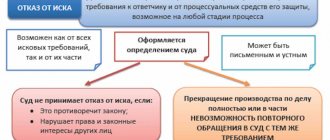How to clarify your position during a case in court
The company wants to file an appeal or cassation with additional justification for its position, which will help overturn the court decision. It is not clear how to add additions, because the APC does not establish special rules for this. In such a situation, it is necessary to rely on the opinion of the courts. The article contains three rules from practice; adhere to them so that the court accepts additional arguments.
What should a short complaint contain?
In fact, a short complaint differs from a regular one in terms of the essence of the problem. In other words, in the place where the reasons for disagreement with the decision of the trial court are indicated, brevity is needed.
Again, the wording should be such that the essence of the problem is not lost. At the same time, it is necessary to take into account that an ordinary complaint is written based on the content of the motivational part and on it.
A short complaint is drawn up in the absence of information about the reasons for the court’s decision. However, you cannot build your arguments on the operative part alone. The court may leave it without motion, indicating that it is unfounded.
Therefore, it is necessary to at least partially anticipate the motivational part and use interpretations that are relevant to the final court decision.
An experienced arbitration lawyer can easily overcome all these difficulties. Call us and we will tell you what your short appeal to the arbitration court should contain. A sample for general writing can be downloaded from our website.
Submit additions on time
Sometimes, after filing a complaint with a court of appeal or cassation, it becomes necessary to present additional arguments in favor of canceling or changing the appealed decision. This is relevant in situations where short complaints are filed without justification, for example, when the motivation part is still missing or when the applicant has not received court notices and is not familiar with the case materials.
In order to accept additions to the complaint, the court will find out the period when the company submitted them. The APC does not establish a specific time period within which additions must be submitted. The courts adhere to the rules that are established for filing appeals and cassation complaints.
An appeal is filed within a month after the arbitration court of first instance adopted the appealed decision. The time to file a cassation appeal is two months. This period begins to run from the day when the appealed judicial act came into force.
The company may have missed the deadline for submitting amendments. In this case, you should be prepared to justify the reasons why it was impossible to present additional arguments on time.
For an applicant who missed the deadline without a good reason, the court may refuse to accept additions to the complaint. Example: customs filed a petition to the cassation court to include additions. The court refused because the applicant missed the deadline: the lower court made a decision on January 17, and the customs office filed a petition only in April.
The court also noted that the government agency actually filed an additional complaint with new arguments, missed the time for filing it, but did not justify the missed deadline with valid reasons.
An additional basis for refusal will be the fact that the applicant submitted additions immediately before the meeting. For example, in one case, the company wanted to challenge the court decision and filed additional materials to the complaint. The court still refused the company.
Firstly, society presented new evidence and presented arguments that were not there before, and this cannot be done. Secondly, the company filed a motion to add additions to the case 15 minutes before the meeting, so the court did not accept new arguments.
Courts do not always refuse to accept additions that applicants file outside the appeal periods. For example, courts tend to accept additions if they have doubts about the position, in which case the hearing is adjourned or adjourned. The judges need time between meetings to separately study the new arguments presented.
Courts of appeal and cassation rarely explain the reasons why they grant requests for addition of additions. Because of this, in judicial practice the conclusions still prevail that it is unacceptable to include additions that the applicant submitted after the established time intervals.
There are also opposite positions, when judges accepted additional arguments outside the deadlines, but did not motivate their decisions. For example, the Supreme Arbitration Court accepted the party’s additional arguments, but did not even comment on the fact that the applicant filed them late. This suggests that it is legal to file amendments even if the applicant missed the deadline.
Addendum to the appeal against the decision of the Moscow Arbitration Court
Full description
To the Ninth Arbitration Court of Appeal
127994, Moscow, Solomennaya Storozhki proezd, 12
Plaintiff: A
Defendant (applicant): B
A third party who does not make independent claims regarding the subject of the dispute: B
Addendum to the appeal against the decision of the Moscow Arbitration Court
The Moscow Arbitration Court made a decision in the case of the recovery from B in favor of A of a penalty for improper fulfillment of obligations under an agreement for the supply of petroleum products in the amount of 1,045,847.11 rubles; The state duty amounted to 20,363.11 rubles.
In accordance with Article 270 of the Arbitration Procedural Code of the Russian Federation (hereinafter referred to as the Arbitration Procedure Code of the Russian Federation), the grounds for changing or canceling
decisions of the arbitration court of first instance are:
1) incomplete clarification of circumstances relevant to the case;
2) failure to prove circumstances relevant to the case that the court considered established;
3) discrepancy between the conclusions set out in the decision and the circumstances of the case;
4) violation or incorrect application of substantive law or procedural law.
When considering the case in the arbitration court of first instance, the following violations occurred: incomplete clarification of circumstances relevant to the case and failure to prove circumstances relevant to the case that the court considered established.
I. _
Due to the fact that the debtor was not provided with evidence of the transfer of the claim to a new creditor, it is legal to charge a penalty until February 19, 2009 (Calculation of the amount of the penalty in Appendix No. 1).
In accordance with section 12 of the Agreement “Details of the parties”, the notice of assignment (with evidence of transfer of the claim to the new creditor) had to be sent to both specified addresses of the buyer:
— legal address 649007, Altai Republic, Gorno-Altaisk, st. Lenina, 199
— actual address 625000, Tyumen, st. Chelyuskintsev, 29.
The location of a legal entity is determined by the place of its state registration (clause 2 of Article 54 of the Civil Code of the Russian Federation).
B sent notification of the completed assignment of the right of claim under the Agreement only to the actual address of the buyer. The defendant did not receive the notice at the actual address; the envelope was returned to the address of the plaintiff from Fr.
The notification was not sent to the legal address (there is no evidence of sending in the case materials).
In this regard, the debtor (B) did not receive evidence of the transfer of rights of claim to the new creditor (A). This fact is confirmed not only by the inventory of the attachment with a postal mark, but also by the official correspondence of the parties, in particular by the objection to claim A ref. No. 243 dated May 28, 2009.
In accordance with Article 385 of the Civil Code of the Russian Federation
the debtor
has the right not to fulfill the obligation
to the new creditor
until he is provided with evidence of the transfer of the claim to this person.
A creditor who has assigned a claim to another person is obliged to transfer to him documents certifying the right of claim and provide information relevant to the implementation of the claim.
According to paragraph 3 of Art. 406 of the Civil Code of the Russian Federation on a monetary obligation, the debtor is not obliged to pay interest during the creditor’s delay.
This position is confirmed in arbitration practice. Resolution of the Federal Antimonopoly Service of the North-Western District dated April 24, 2007 in case No. A21-2960/2006:
The court found that SME Rossban LLC was not notified of the assignment of the right of claim when concluding the assignment agreement.
SME Rossban LLC learned about the assignment of the claim when it received from IK LLC a statement of claim for recovery of the loan amount, the right to claim which was transferred to the plaintiff under the assignment agreement dated 03/09/2004. However, this is not proper execution of the debtor’s notice of the transfer of the right of claim against him on the basis of an assignment agreement, as was reasonably indicated by the court of appeal.
In accordance with paragraph 3 of Article 382 of the Civil Code of the Russian Federation, if the debtor was not notified in writing of the transfer of the creditor's rights to another person, the new creditor bears the risk of the adverse consequences caused by this for him. In this case, the fulfillment of the obligation to the original creditor is recognized as fulfillment to the proper creditor.
By virtue of paragraph 3 of Article 405 of the Civil Code of the Russian Federation, the debtor is not considered to be in default until the obligation cannot be fulfilled due to the creditor’s delay.
It is worth noting that the defendant independently calculated the penalty (Appendix No. 1),
according to which the maximum amount of the penalty is 1,489,768 rubles. 70 kopecks. However, according to the plaintiff, the amount of the penalty is 2,091,694 rubles. 23 kopecks... which is significantly different from counter-calculation. The amount of the penalty received by the plaintiff exceeds the defendant’s data by 601,925 rubles. 53 kopecks, and therefore is incorrect and subject to revision.
II . Delivery according to delivery note No. 4333 dated 08/03/2008 for RUB 3,054,661.60. took place outside the scope of the Agreement , since there is no annex to the agreement in which the essential terms of the supply agreement were agreed upon: name, quantity, delivery conditions and price of the product batch (according to clause 1.2 of the Agreement).
According to clause 1.2 of the Agreement, the name, quantity, delivery terms, payment terms and price of each batch of products to be supplied are agreed upon by the parties in the appendices for each product delivery period.
The claims and demands of the claim were based on obligations to pay for goods in accordance with Annexes No. 7 of 08/06/2008, No. 9 of 08/19/2008 and No. 10 of 09/11/2008.
Appendices No. 7, 9, 10 agreed on the terms of delivery of stable gas condensate. Summer diesel fuel was not the subject of supply under the Agreement.
Delivery according to consignment note No. 4333 dated 08/03/2008 was not agreed upon by the parties in a separate annex to the contract.
Thus, the liability provided for in the Agreement is not applicable to delivery under the specified delivery note. The specified delivery note is a one-time purchase and sale agreement. For late payment there is liability in accordance with Art. 395 of the Civil Code of the Russian Federation.
Qualifying the delivery note as a one-time purchase and sale agreement allows you to reduce the penalty by 59,749.93 rubles.
(according to the plaintiff's calculations).
III . The defendant petitions for the application of Article 333 of the Civil Code of the Russian Federation.
The defendant may petition to reduce the amount of the penalty as disproportionate on the basis of Art. 333 Civil Code of the Russian Federation. In accordance with Art. 333 of the Civil Code of the Russian Federation, if the penalty payable is clearly disproportionate to the consequences of violation of the obligation, the court has the right to reduce the penalty.
The penalty presented for collection is 36.5% per annum, while the refinancing interest rate applied when calculating interest for the use of other people's funds has been 8.5% since February 24, 2010 ( Instruction of the Bank of Russia dated February 19, 2010 No. 2399-U “On the size of the refinancing rate of the Bank of Russia”).
In paragraph 42 of the Resolution of the Plenum of the Supreme Court of the Russian Federation No. 6 and the Plenum of the Supreme Arbitration Court of the Russian Federation No. 8 of 01.07.1996 “On some issues related to the application of part one of the Civil Code of the Russian Federation” it is indicated that when deciding on the reduction of the penalty, it is necessary to have in view that the amount of the penalty can be reduced by the court only if the penalty payable is clearly disproportionate to the consequences of the violation of the obligation. When assessing such consequences, the court may take into account, among other things, circumstances that are not directly related to the consequences of breach of obligation (price of goods, work, services, amount of the contract, etc.).
According to paragraph 2 of the Information Letter of the Presidium of the Supreme Arbitration Court of the Russian Federation dated July 14, 1997 No. 17 “Review of the practice of application by arbitration courts of Article 333 of the Civil Code of the Russian Federation,” the criteria for establishing disproportionality in each specific case may be: an excessively high percentage of the penalty; a significant excess of the amount of the penalty of the amount of possible losses caused by violation of obligations, the duration of non-fulfillment of obligations, etc.
The Determination of the Constitutional Court of the Russian Federation dated December 21, 2000 No. 263-O states that the opportunity given to the court to reduce the amount of the penalty if it is excessive compared to the consequences of violation of obligations is one of the legal methods provided for in the law that are aimed against abuse the right to freely determine the amount of the penalty, i.e., essentially, to implement the requirements of Part 3 of Art. 17 of the Constitution of the Russian Federation, according to which the exercise of human and civil rights and freedoms should not violate the rights and freedoms of other persons. That is why in part 1 of Art. 333 of the Civil Code of the Russian Federation, we are not talking about the right of the court, but in essence, about its obligation to establish a balance between the measure of responsibility applied to the violator and the assessment of actual (and not possible) damage caused as a result of a specific offense.
Taking into account the above, as well as the circumstances that the amount of the principal debt was repaid in full by the defendant on 05/04/2009, which is not denied by the plaintiff, and the claim for the collection of the penalty was filed much later, the amount of the penalty to be collected should be reduced in proportion to the consequences of the violation of the obligation.
IV
.
According to Art.
404 of the Civil Code of the Russian Federation, if non-fulfillment or improper fulfillment of obligations occurred through the fault of both parties, the court accordingly reduces the amount of liability of the debtor. The court also has the right to reduce the amount of liability of the debtor if the creditor intentionally or negligently contributed to an increase in the amount of losses caused by non-performance or improper performance, or did not take reasonable measures to reduce them.
The plaintiff and the former creditor (B) did not take proper measures to properly notify the defendant about the assignment of the rights of claim, which contributed to an increase in the amount of the penalty and made it impossible to negotiate the settlement of the debt between the debtor and the new creditor.
In accordance with Art. 401
Civil Code of the Russian Federation, a person who fails to fulfill an obligation or fulfills it improperly is liable in the presence of guilt (intention or negligence), except in cases where the law or contract provides for other grounds for liability.
V. _ There was an abuse of rights on the part of the plaintiff.
In accordance with Article 10 of the Civil Code of the Russian Federation, actions of citizens and legal entities carried out solely with the intention of causing harm to another person, as well as abuse of rights in other forms, are not allowed.
In case of failure to comply with these requirements, a court, arbitration court or arbitration
tribunal may refuse to protect a person’s rights.
According to paragraph 3 of Art. 382 of the Civil Code of the Russian Federation, if the debtor was not notified in writing about the transfer of the creditor’s rights to another person, the new creditor bears the risk of the adverse consequences caused by this for him. In this case, the fulfillment of the obligation to the original creditor is recognized as fulfillment to the proper creditor.
B sent notification of the completed assignment of the right of claim under the Agreement only to the actual address of the buyer. No notification was sent to the legal address. In this regard, B did not receive notice of the assignment of the right of claim that took place on February 19, 2009, which did not allow the debt repayment issues to be resolved with the new creditor.
An agreement dated April 24, 2009 was concluded between B and the previous creditor (B), which provided for the repayment of part of the debt in the amount of RUB 1,277,998. by transferring funds, during which the parties do not have the right to make any claims, including regarding the collection of penalties.
B and A are interested in disapproval of the above transaction, since the former creditor and the new creditor have one sole executive body - the general director _______, and a similar composition of founders.
B duly fulfilled her obligations to the former creditor, the former creditor accepted the performance, refusing to collect the penalty under the contract.
The new creditor accepted what was performed under this agreement, but, abusing his right, turned to B to collect the penalty. The essence of the abuse of right on the part of the plaintiff is that the plaintiff, represented by the sole executive body, accepted the execution as the previous creditor, but in violation of the agreement reached by the parties, applied for the recovery of a penalty.
Based on Art. 257, 260, 269, 270 Arbitration Procedure Code of the Russian Federation,
ASK:
1. The decision of the Moscow Arbitration Court is cancelled.
2. Redistribute the costs of paying state duty between the parties.
3. Adopt a new judicial act in the case
.
Application:
1. Calculation of the penalty - on 1 sheet.
2. 1Documents confirming the direction of the addition to the appeal to the plaintiff and a third party who does not make independent claims regarding the subject of the dispute - on 6 sheets.
3. Power of attorney of the representative of the defendant (applicant) (copy) – 1 sheet.
Representative B
Send additions to the other side of the dispute
Companies that submit additional arguments to the court for complaints are required to show them to all participants in the case. That is, it is necessary to send additions to other participants, including the second party to the dispute, so that it has time to prepare arguments in defense.
It is risky not to send additional arguments to opponents in a dispute, since the courts believe that in this case the company is violating the procedural order and refuse to accept the additions. Example: a company went to court to recover lost profits from the defendant and lost. When the case was reconsidered, she submitted additions to the complaint to the court, but it did not accept them. The reason for the refusal was that the company did not send them to the defendant, thereby violating the principles of adversarial arbitration.
When you begin to send additional arguments to the other side, keep evidence that you did this. For example, if you send paper materials by mail, do not throw away the mailing receipt. Ask the other party to send confirmation of receipt of the letter. The court may not accept additions to the complaint if the company does not prove that it sent them to other parties to the dispute.
Sometimes the court may accept additional arguments to the complaint, even if the applicant did not send them to the other party. Then the judges will give all participants in the case time to familiarize themselves with the additions and prepare objections to new arguments. To do this, the court, at the request of the party, will announce a break or postpone consideration of the complaint for a while.
Generalizations and useful tips when filing a preliminary appeal to the arbitration court
So, a short complaint to the arbitration court should be written if:
- There is a delay in making a final decision in the arbitration case.
- There is confidence in what the motivational part will contain.
- There are solid grounds for appeal.
- Alternatively, delay the consideration of the case.
We recommend! Appeal in civil proceedings
In other cases, of course, there may be hope for success, but you should not delude yourself too much.
Among other things, as advice, it is recommended not to indicate in the complaint about the delay in the judge making a final decision, although this is not prohibited. This is unlikely to significantly help matters. It is best to write a short complaint.
Well, in order for everything to go smoothly, you need to contact a law firm. There are too many nuances, and, therefore, the chances of making a mistake are very high. No need to take risks. This will not lead to success.
Reasons for filing
The appeal is prepared according to the rules of Chapter 34 of the APC:
- It is submitted by persons who participated in the case as a plaintiff, defendant or third party.
- It is transmitted through the first instance.
- It can only be filed in relation to a decision that has no legal effect.
In order for an appeal against a court decision to be satisfied, it must be based on compelling reasons. The list of such grounds under Art. 270 APK can be included:
- Incomplete definition of circumstances that are important to the case.
- Lack of proof of circumstances that influenced the outcome of the case.
- Violation by a judge of the norms and requirements of substantive and procedural law or their incorrect interpretation by the judge.
- Inconsistency of the court's conclusions with the evidence.
Making an additional complaint
The addition to the appeal is drawn up identically to the main complaint. In practice, the first complaint is taken as a basis: something is completely copied, something is supplemented and clarified. All legal requirements for the form and content of the appeal must be complied with. That is, you cannot simply prepare a letter, petition and statement - everything must be done as in the case of the first complaint.
Important:
- Requirements that were not stated during the consideration of the case in the first instance cannot be included in the text.
- You can point to new circumstances, evidence, bring new arguments, but you need to justify why it was not possible to present evidence in the first trial.
- The supplement must be treated with the utmost responsibility. If the court accepts an additional complaint, then it will consider the position and arguments stated in it to be the main ones.
How to write an addition to an appeal:
- Determine what you want to clarify, add or change in the main complaint.
- Rewrite the main complaint, taking into account the necessary adjustments and additions, or compose the complaint again if the volume of changes is large.
The addition should concern only the content - position, arguments, evidence, references to laws. All procedural formalities remain unchanged.
How to submit
Based on the provisions of paragraph 1 of Art. 260 of the APC, an appeal can be filed in the following ways:
- In written format, in person through the court office . In this case, on the second copy of the complaint, it is worth obtaining confirmation of the fact of transmission of the complaint in the form of a secretary’s mark.
- In writing by registered mail with a list of the contents and notification of delivery.
- In electronic format using the arbitration court page on the Internet using the “EDS” service . All attached documents should also be pre-translated into electronic format.
The procedure for transmitting documentation in electronic format is contained in the Order of the Judicial Department under the Supreme Court of 2021 No. 252.
The complaint is submitted by the person authorized to transmit it or his representative with a power of attorney to represent interests.
The person who is responsible for sending the complaint, by law, provides other participants in the case with copies of the complaint and the documents attached to it under paragraph 3 of Art. 260 APK.
A copy is handed over personally against signature or sent by registered mail with acknowledgment of receipt.
Powers of the arbitration court of appeal
16th Arbitration Court of Appeal.
The powers of arbitration courts of appeal are determined by Art. 33.3 of the Law, namely:
- Checks the legality of the decisions of the Court of Justice, which have not yet gained legal force, considers the case again, establishes the fairness or unfoundedness of the claims;
- Opens the case again if the applicant provides facts indicating newly discovered circumstances;
- Conducting analysis and summarizing information obtained as a result of judicial practice;
- Sending recommendations to improve current legislation, amend specific laws, codes of regulation;
- Processing of forensic statistical data.
In addition, the AAS has the right to appeal to the Constitutional Court if doubts arise about the unconstitutionality of the law referred to by the parties to the dispute.
What is an additional complaint and what problems does it solve?
An additional or clarified appeal is a procedural document that is drawn up and filed in the same manner as the main complaint. Since procedural legislation does not regulate this issue separately, it is necessary to rely on established judicial practice.
The need to supplement the appeal may be objective. For example, new circumstances have emerged that are not reflected in the complaint. Or you need to clarify the requirements and (or) justification. The decision to file an additional complaint may be influenced by the feedback provided by the other party, to which you must provide your assessments and counter-arguments.
However, often the division of an appeal into a main and an additional one is a predetermined action plan. Initially, only the formal requirements for the complaint are met, where the main task is to meet the deadline and get the complaint accepted for processing. At the second stage, an additional complaint is carefully prepared, which sets out the position in detail, and most importantly, all the arguments and evidence are presented in detail. In essence, this approach allows the complaint to be well processed under the conditions of a limited appeal period. It also allows you to “test” the position of the other party to the case - see how it will react to the very fact of the appeal and what it will indicate in its response to the complaint. Often the opponent is simply put in an awkward position - he is not given the opportunity to thoroughly prepare for the process.




